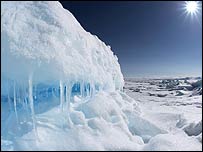climate change
Climate change is any significant change in measures of climate (such as temperature, precipitation, or wind) lasting for an extended period (decades or longer). Climate change may result from:
A natural system known as the greenhouse effect regulates the temperature on Earth. Human activities have the potential to disrupt the balance of this system by increasing the amount of heat-trapping gases in the atmosphere which enhances the warming capability of the natural greenhouse effect. It is the human-induced enhanced greenhouse effect that causes environmental concern. It has the potential to warm the planet at a rate that has never been experienced in human history.
 |
Climate change is more than a warming trend. Increasing temperatures will lead to changes in many aspects of weather, such as wind patterns, the amount and type of precipitation, and the types and frequency of severe weather events that may be expected to occur. Climate change could have far-reaching and/or unpredictable environmental, social and economic consequences.
